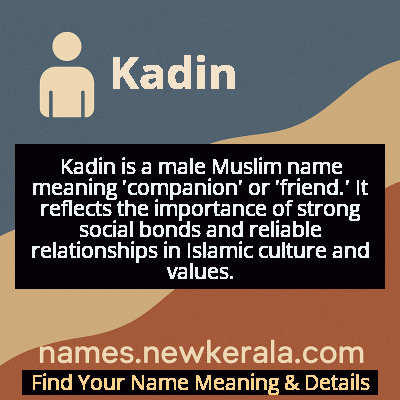Kadin Name Meaning & Details
Origin, Popularity, Numerology Analysis & Name Meaning of Kadin
Discover the origin, meaning, and cultural significance of the name KADIN. Delve into its historical roots and explore the lasting impact it has had on communities and traditions.
Name
Kadin
Gender
Male
Origin
Muslim
Lucky Number
3
Meaning of the Name - Kadin
Kadin is a male Muslim name meaning 'companion' or 'friend.' It reflects the importance of strong social bonds and reliable relationships in Islamic culture and values.
Kadin - Complete Numerology Analysis
Your Numerology Number
Based on Pythagorean Numerology System
Ruling Planet
Jupiter
Positive Nature
Optimistic, inspirational, and creative.
Negative Traits
Scattered, exaggerating.
Lucky Colours
Yellow, gold, purple.
Lucky Days
Thursday.
Lucky Stones
Yellow sapphire.
Harmony Numbers
1, 2, 9.
Best Suited Professions
Arts, writing, communication.
What People Like About You
Creativity, optimism.
Famous People Named Kadin
Kadin Shedrick
Basketball Player
NCAA Division I basketball player for Texas Longhorns
Kadin Hennessy
Musician
American drummer and percussionist
Kadin Tooley
Football Player
American football wide receiver
Name Variations & International Equivalents
Click on blue names to explore their detailed meanings. Gray names with will be available soon.
Cultural & Historical Significance
The name's cultural resonance extends beyond religious contexts to encompass broader human values of friendship and community. In many Muslim societies, naming a child Kadin expresses the parents' hope that their son will grow to be a good friend and valued member of his community. This reflects the Islamic emphasis on social responsibility and the importance of maintaining strong, ethical relationships. The name serves as a daily reminder of one's duty to be a reliable companion and positive influence in others' lives, aligning with prophetic traditions that emphasize the importance of good character and social bonds.
Extended Personality Analysis
Individuals named Kadin are often perceived as naturally sociable, loyal, and dependable companions. They tend to excel in building and maintaining relationships, showing genuine interest in others' wellbeing and creating strong social networks. Their inherent friendliness and approachability make them popular in social circles, while their reliability ensures they're trusted by friends and colleagues alike. Kadins typically demonstrate excellent communication skills and emotional intelligence, allowing them to navigate complex social situations with ease. They often serve as peacemakers in conflicts and are valued for their ability to bring people together.
Beyond their social strengths, those named Kadin often exhibit a balanced personality that combines extroversion with thoughtful introspection. While they enjoy social interactions, they also possess the wisdom to know when to listen rather than speak, making them excellent confidants. Their loyalty extends beyond mere friendship to include commitment to principles and causes they believe in. This combination of social grace and personal integrity often leads them to leadership positions where they can facilitate cooperation and understanding among diverse groups. Their name's meaning seems to manifest in their natural inclination toward building bridges between people and fostering harmonious relationships in all aspects of life.
Modern Usage & Popularity
In contemporary times, Kadin has gained popularity as a modern, multicultural name that bridges Islamic heritage with global appeal. While maintaining its traditional Muslim roots, the name has seen increased usage in Western countries as parents seek names that are both meaningful and distinctive. Its popularity has been steadily growing in the United States and Europe, particularly among Muslim communities and those appreciating its positive meaning. The name's simple spelling and easy pronunciation contribute to its cross-cultural acceptance. Recent naming trends show Kadin appearing more frequently in diverse social and ethnic contexts, reflecting broader cultural integration while preserving its original significance as 'companion.' Digital globalization and social media have further popularized the name, making it accessible to parents worldwide who value its positive connotations and multicultural flexibility.
Symbolic & Spiritual Meanings
Symbolically, Kadin represents the human need for connection, friendship, and community. It embodies the concept of reliable partnership and mutual support in life's journey. The name carries metaphorical significance as a bridge between individuals, cultures, and communities, reflecting the idea that human relationships form the foundation of society. In a deeper sense, it symbolizes the Islamic values of brotherhood and the importance of having trustworthy companions in both worldly matters and spiritual pursuits. The name also represents the balance between individuality and community, suggesting that one's identity is enriched through meaningful connections with others. This symbolic meaning extends to representing the ideal of being a positive presence in others' lives and contributing to collective wellbeing.

